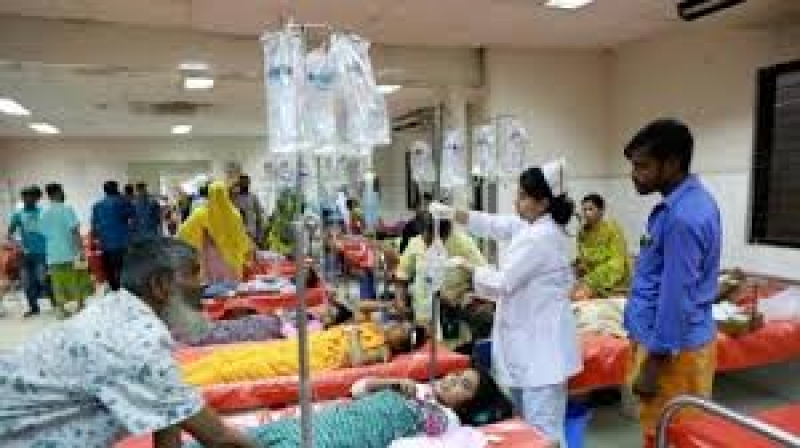- India Sees 9% Drop in Foreign Tourists as Bangladesh Visits Plunge |
- Dhaka Urges Restraint in Pakistan-Afghan War |
- Guterres Urges Action on Safe Migration Pact |
- OpenAI Raises $110B in Amazon-Led Funding |
- Puppet show enchants Children as Boi Mela comes alive on day 2 |
Ghost Roads, Empty Hospitals: Corruption Derails Bangladesh

As Bangladesh pushes toward its goal of becoming a developed nation, one force continues to drag it backward: corruption. Systemic and deeply entrenched, it stretches from mega infrastructure projects to the most basic public services, turning promises into hollow shells and public trust into growing disillusionment.
Glitz and Graft: The Illusion of Mega Development
On paper, Bangladesh is booming. Glimmering billboards promote “mega development” — highways, hospitals, and power plants — while GDP growth paints a picture of progress. But on the ground, it’s a different story.
A 2023 World Bank report estimated that over 2% of the country’s GDP is lost annually to corruption, mostly in public procurement and infrastructure. Many projects exist only on paper or deteriorate rapidly due to fraud, poor oversight, and political favoritism.
In Kurigram, a rural road meant to connect 10,000 people is now barely passable. Locals say substandard materials were used, with bills cleared before proper work was done.
“The road was built on paper, not in reality,” said a local union council member, requesting anonymity.
This is no isolated incident. A 2022 audit by the Local Government Engineering Department found that over 40% of rural projects suffered from serious irregularities — fake tenders, phantom contractors, and non-existent progress.
White Elephants and Broken Promises
In Kishoreganj, a highly publicized “all-weather” road is now a muddy, pothole-riddled mess. Constructed at enormous cost, it was meant to boost transport and the local economy. Today, it’s a symbol of waste and mismanagement.
“They promised us a better life. What we got was mud and misery,” said Abdul Karim, a resident of Pakundia upazila.
Transparency International Bangladesh (TIB) found that nearly 30% of rural infrastructure funds are lost to corruption. Roads inaugurated with media fanfare are often abandoned once the cameras leave.
Even urban areas aren’t immune. In Patuakhali, a road built under a rural development scheme is known locally as the “road to nowhere.” Built, billed, and already crumbling.
Hospitals Without Doctors, Budgets Without Care
The health sector tells a similarly bleak story. In Barisal, a brand-new 100-bed hospital stands eerily empty — no doctors, no nurses, no equipment. Built but never staffed, the facility is now a ghost hospital.
“We built the hospital. But staffing? That’s another contract, another bribe,” admitted a mid-level health official.
In Rajshahi, another hospital sits idle, earning the nickname “hospital of ghosts.” Despite crores spent, it’s yet to admit a single patient. Locals must travel 40 kilometers for basic care.
A TIB investigation revealed that bribery consumes up to 25% of rural healthcare spending. Funds for staffing, equipment, and medicine are routinely misappropriated. The COVID-19 pandemic only amplified the rot: fake invoices, defective oxygen tanks, and phantom patients were rampant.
A Corruption Cartel, Politically Protected
From school construction to relief distribution, corruption is everywhere. Projects are often approved not for public benefit, but to funnel money through patronage networks.
“The work is secondary. What matters is the kickback,” said a senior government official off the record.
Despite periodic investigations by the Anti-Corruption Commission (ACC), few cases lead to convictions. Between 2018 and 2023, over 80% of major cases either stalled or ended in lenient sentencing.
Contract awards often favor ruling party affiliates. Relief programs like the Old Age Allowance or VGD food cards routinely require bribes for inclusion.
“In our village, you need to pay Tk 5,000 to get listed for government aid,” said Shahana Begum, a widow from Narayanganj.
Growth Without Impact
Economists warn that Bangladesh is entering a dangerous phase: high growth with low public impact. GDP numbers rise, but services collapse.
“Bangladesh is building — but not for the people,” said Dr. Zillur Rahman, a governance expert. “When roads crumble within years and hospitals stand empty, it’s not just inefficiency. It’s theft.”
Dr. Nazrul Islam echoed the concern: “Corruption is eating away at our future. Growth will mean little if citizens are denied health, education, and dignity.”
The Way Forward: Reform or Regression
Experts call for sweeping reforms: greater independence for the ACC, digitized procurement, and real-time project monitoring. Political interference must end, and whistleblowers must be protected.
Without transparency and accountability, Bangladesh risks becoming a country of “ghost projects” — where development is a show, not a solution.
“We don’t just need hospitals and roads,” said a schoolteacher in Dhaka. “We need them to work. Otherwise, it’s all just concrete and corruption.”

